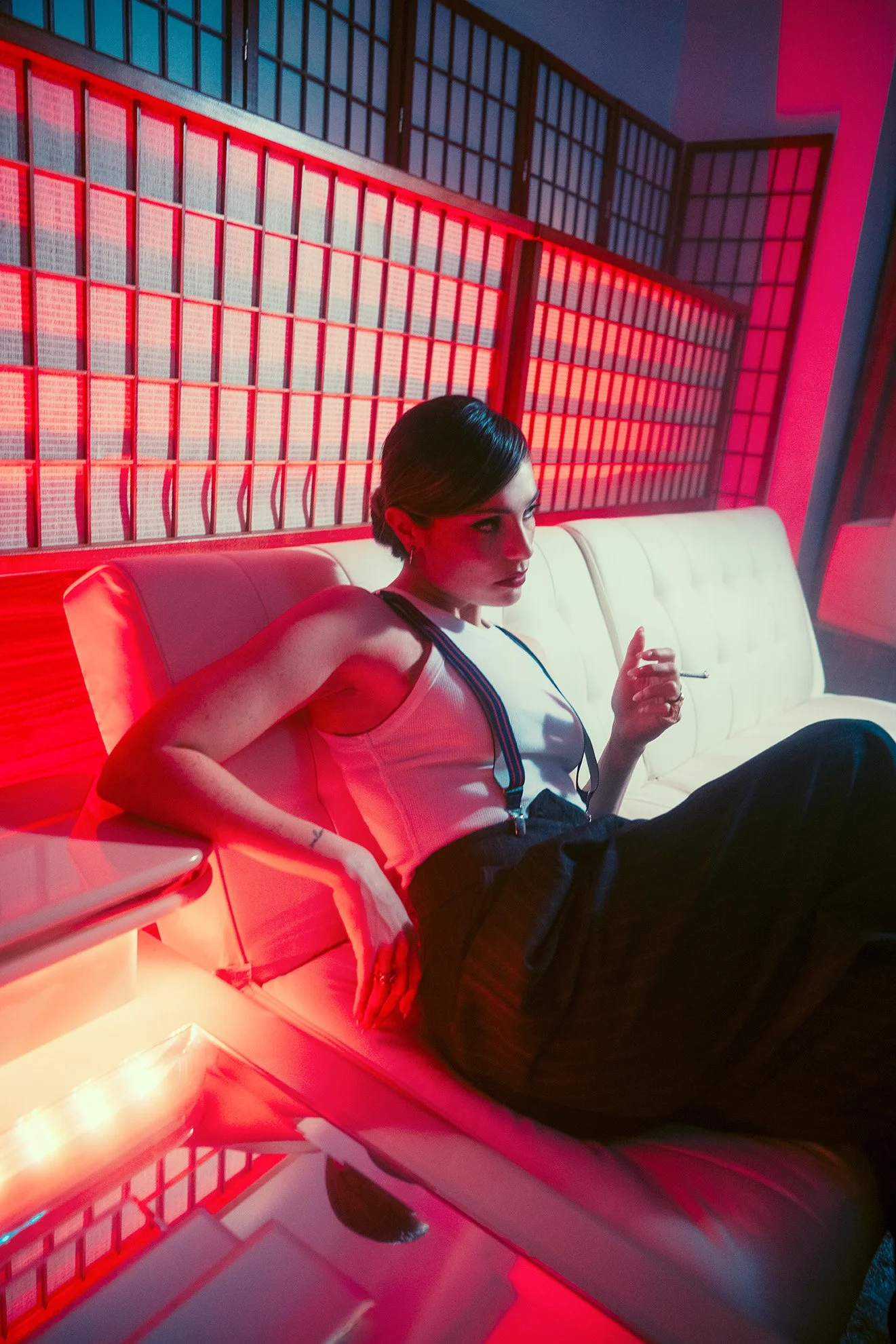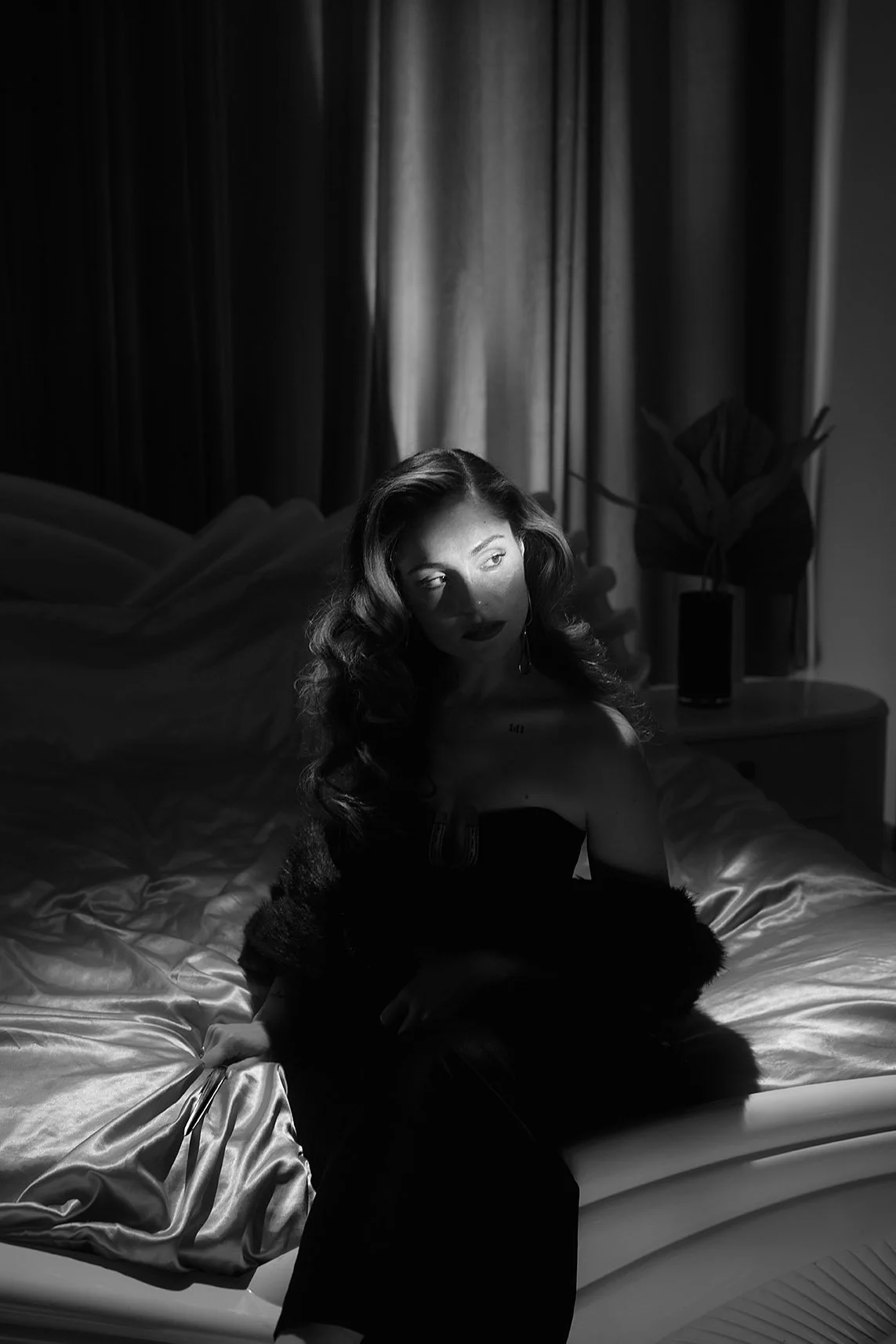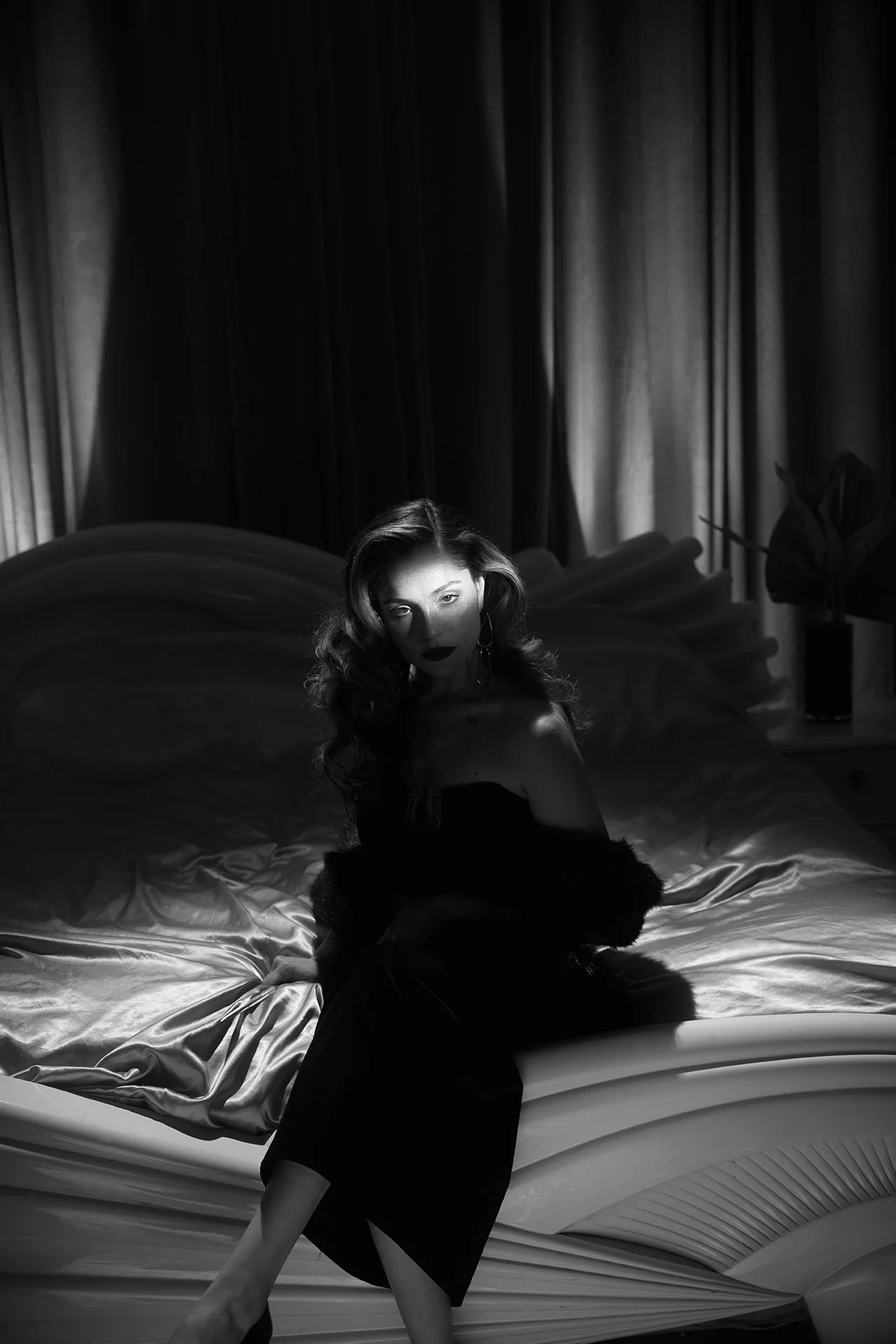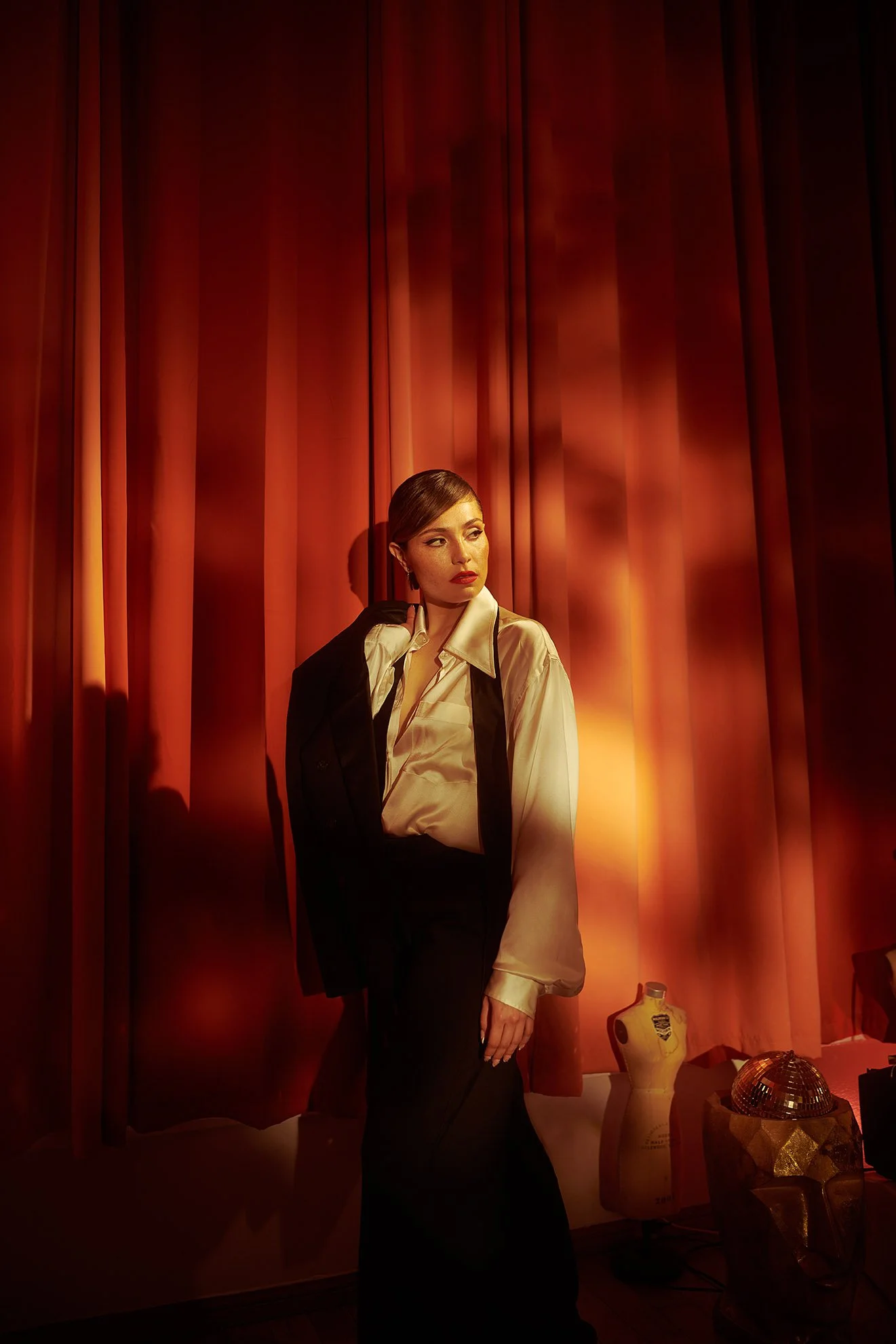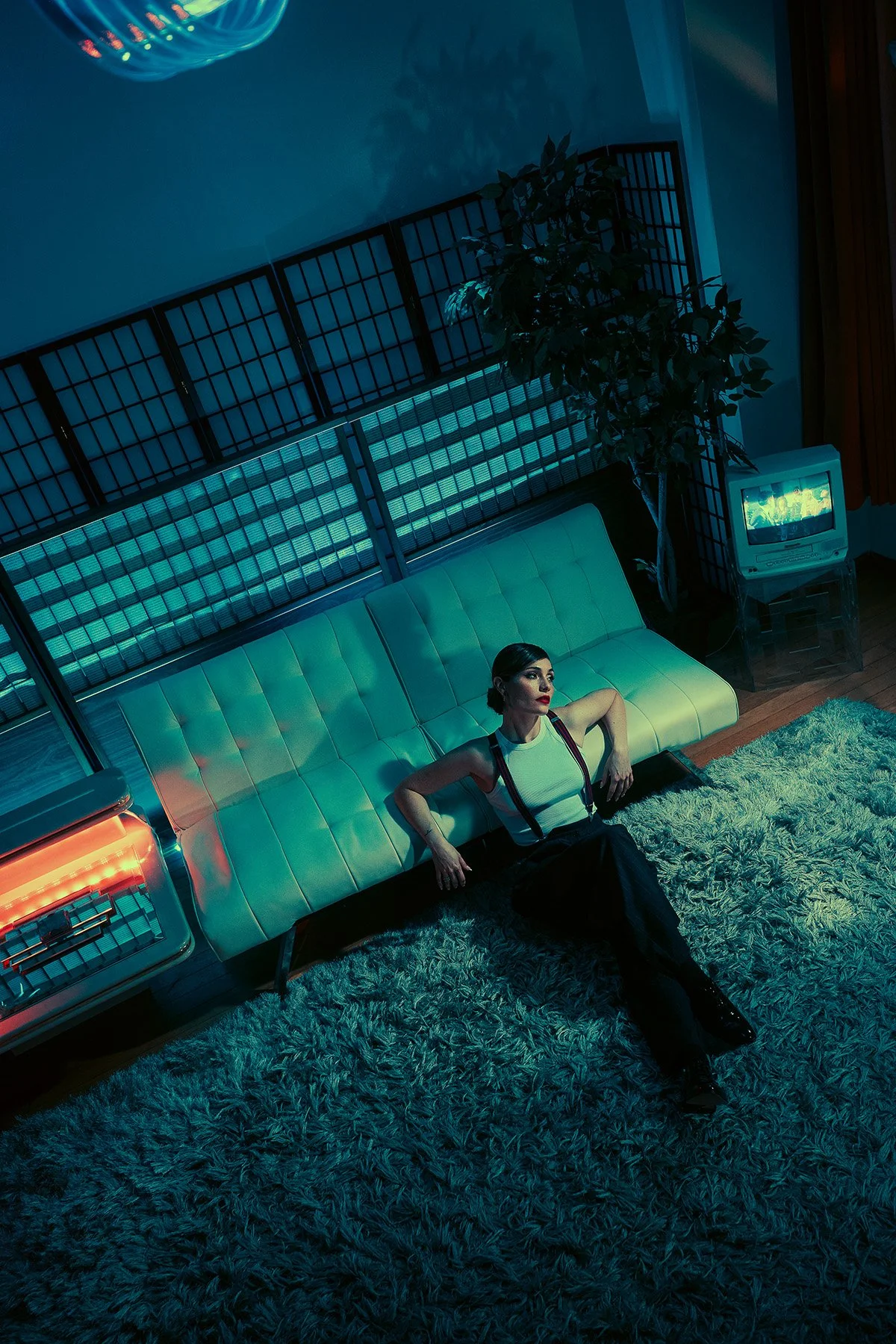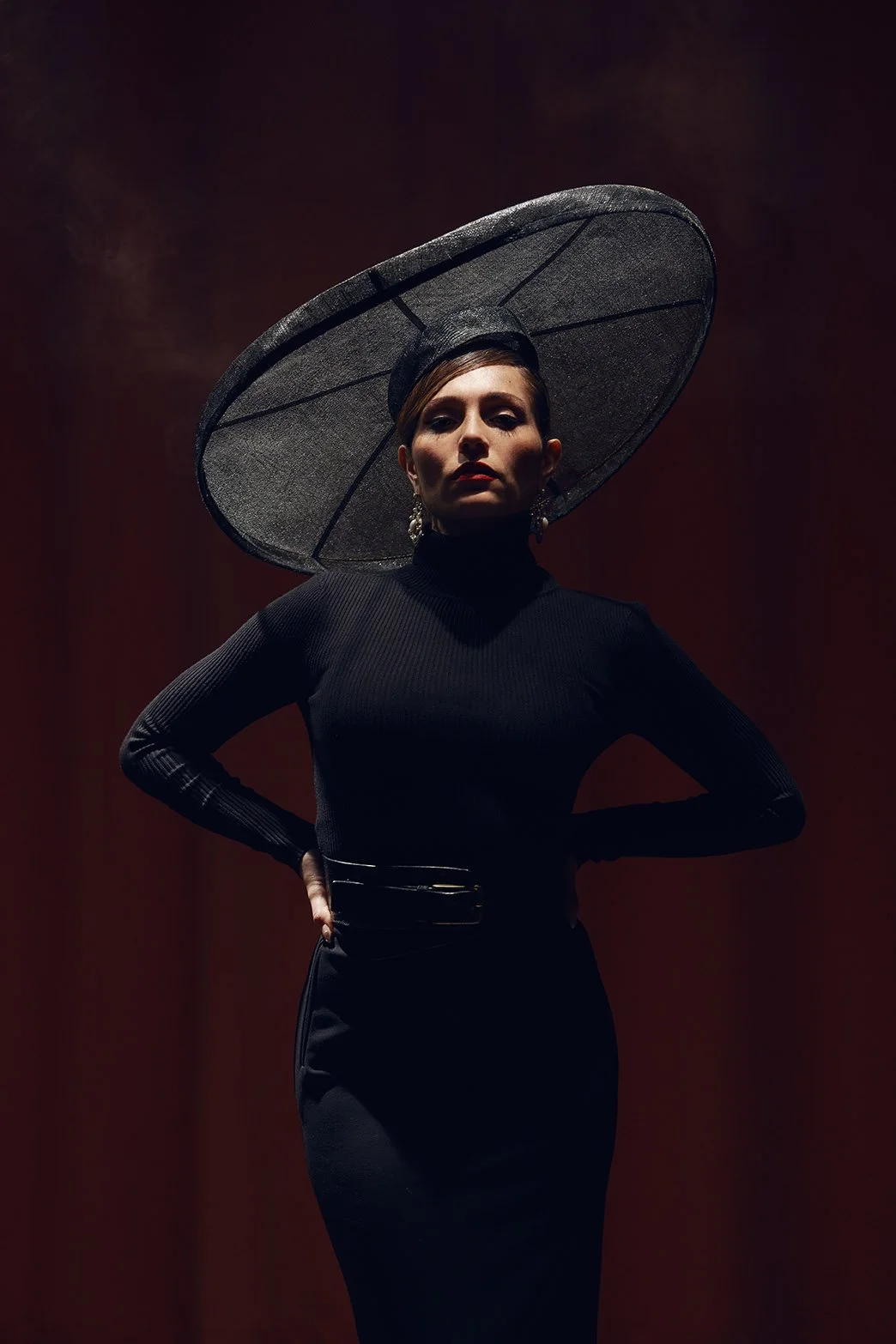Juliana Aidén Martinez
Robe HAVEN WELL WITHIN Bodysuit PAOLA ESTEFANIA Earrings LARRY PLATT
Interview by Nolwen Cifuentes
Photography by Erica Hernandez @ PictureKid
Styling by Becky Thompson @ The Rex Agency
Makeup by Jen Tioseco @ The Wall Group
Hair by Tracy Moyer @ The Rex Agency
Photo Assisting by Eric Crain
You’re Colombian, born in Miami, right?
Yeah, I was born in Miami. I’m mixed. My dad is Colombian and my mom is of Polish Jewish descent, so that's where I get my freckles. Kudos to my mom for giving me freckles. My dad, I have other features like my eyes, hair– I can tan.
Right! Same, I can tan.
Right! I was very immersed in my dad's culture though. So I grew up speaking Spanish, eating Colombian food, going back and forth to Colombia. I went to preschool at some point for a few months [in Colombia] when I was a kid. We were planning to live in Colombia until my family decided we were going to move back to Miami.
Yeah, right. Okay.
I definitely feel that sometimes I walk in being like, I'm Latina from Miami!
Yeah. Especially that you speak Spanish, too. My Spanish sucks, I feel like if you speak the language, you’re more connected to that side.
I could see that. My dad was adamant about speaking Spanish with us. To this day, I only speak Spanish with him. I also think it's because he moved to the states older, so he was already in his 30s when he moved into the states. He basically decided, this is who I am.
Tank BUCK MASON Pants ASTR Shoes REBECCA CREWS Suspender STYLIST’S OWN
Moving on to Griselda, how did you land this role?
Well, I was in New York at the time, I graduated from Yale Drama in 2020, right as the pandemic hit — the best time to enter the workforce [Laughs]. I applied for the mentorship — the Hillman Grad Mentorship Lab. It was something Lena Waithe was running. And interestingly enough the journey began with my very first audition outside of school, for the amazing casting director Rachel Tenner. It was for a role much older than me, like a lady in her 70s, I remember thinking “why am I auditioning for this?” But Rachel became a fan of mine from that audition.
Then, fast forward a year later, I was still in New York, I had done a few TV jobs and professional jobs by then. I remember I was doing theater. And then this audition [Griselda] comes in from Rachel. There was a code name for it and so I had no idea what it was about. I just knew that Sofia Vergara was attached, and I knew that it was from the creators of Narcos. And I knew I always wanted to work with them. That team worked with very talented people from Latin America. I knew I always wanted to work with our director Andrés Baiz, with our showrunner Doug Miro, with our executive producer Eric Newman. I thought they had great taste and made incredible projects. However, all l I had seen was this code name, and that it was a detective from Miami. I didn't know the extent of how large that role was.
Ok, wow. So you audition, and then what?
I hadn't heard anything, which I now know is because they were rewriting everything. A few months passed [after the audition] and then I get a call that they rewrote some new material and they wanted me to submit for this again. I was synchronistically finishing up that mentorship with Lena Waithe at that time, and I was going to be heading to LA for our showcase the following week.
My agent's like, hey, the director wants to talk to you on Zoom. So, I met Andrés on Zoom. We talked for 15 minutes. And as soon as we got off of Zoom, I remember thinking, I don't think that went well. That was 15 minutes! I didn't think that went well. So I tell my team, listen, whatever he's thinking, if he wants to know if I'm right for the part, if he really wants to know, I'm going to be in LA next week. Tell him to meet me in person. That's how you're going to get a gauge of who I really am.
Right, like, Zoom doesn’t really give you much.
No, it doesn’t! And because I was heading to LA that following week for the [Hillman Grad] showcase, I ended up meeting that director at the right time. It was on the morning of, when I was heading back to New York. We talked for an hour and we just, clicked.
It was very much like a movie. We were at this coffee shop, and he’s right about to leave, and the sun was hitting his face in a certain way. And he turns to me and says, you're going to hear from me very soon. And then he smiles and walks away. I remember being like, what does that mean? I looked at the barista — I was the only one in the coffee shop — and I'm looking at her, she's looking at me, I'm looking at him, who has just left, and I'm like, what does that mean? Then I called my manager and she said “I want you to go to New York and know that you've booked this. I just want you to know that this is yours.”
Wow, that’s so surreal. And so smart that you made that move to meet him in person too. And at this point, you didn’t realize how big of a role you had?
No, I had no idea. It wasn’t until I started reading the scripts that I realized that I'm the other female lead in this story. It was all a big surprise. But I had no anxiety about it, it all felt natural and aligned in a lovely way.
Dress RAMSTI Stole DO LONG
And then did you do any screen testing or anything with Sofia or other actors?
The first day I met Sofia, I remember they were working with the prosthetics to see how it looked on camera. I was so curious and excited for her. I did some screen tests once I booked the role, but not with her. I believe they were testing lighting and colors in relation to our storylines and by how we looked on camera. When you see the show, you'll notice that my particular world has a specific aesthetic that's — there’s a lot of blues and grays and neutral, muted tones. It establishes how we live in my world. It has a different visual language to Sofia’s world, which is much warmer with more robust red and orange tones. It’s vibrant. So in a cinematic way, I think in the screen test they were experimenting with that visual juxtaposition.
That's really interesting, actually. It wasn’t super obvious when I watched it, but now that I’m thinking back, it’s so true, your scenes are very cool and blue. It definitely visually shows the two ends of the spectrum for these women.
Yeah! They were so smart about it. And for instance, my character is based on a real person, Detective June Hawkins, which I had the enormous privilege to talk to. And in speaking to her and reading the script it revealed to me a landscape that was operating in a deeply psychological and internal energy. There’s a contained power to her. There's this sense of being a wolf on the hunt. I remember listening to a lot of discordant jazz music at the time. And June was interested in painters at a young age. She really liked Renaissance painters like Caravaggio. It was a clue to how my character June saw things. She was someone, to me, that had these epic, biblical struggles within herself. So though you see a visually cold, muted landscape I felt that like there was this rebellious and epic war bubbling underneath.
Blouse REBECCA CREWS Suit PINKO Tie DIOR
That actually leads me to another question. I read that you met with June Hawkins in real life. I’d love to know more about how you prepared for this role and how meeting her affected your performance.
Well, Philip Seymour Hoffman is a huge influence for me and he says this thing with character, that you have to find the similarities and differences of who you play and begin from there. Hopefully then build a bridge between the differences of your character and yourself to create character. I wanted to capture her essence and still have my authenticity there. I wanted her to watch it and still be like, “yeah, that’s me” and it felt natural and authentic. For instance, I wanted to know how she had to operate as a woman in that time period.
Which for me, I was like, the things that are happening in the show, I would have a reaction. I, Juliana. While for her, there could not be a reaction from her. Her source of power had to be that you didn’t merit a reaction, out of fear of being perceived as weak or hysterical. So that power in her had to be happening in her eyes, and in her stillness. But if her male counterparts see a reaction, they’ve won. So these guys pick on you, they denigrate you, they do anything and you have an emotional reaction to it, they've won. And more importantly, for June, I'm not going to do the tactics of these men. I'm not going to assimilate to these tactics. I'm going to follow my truth, ignore your opinion and I'm going to lead this charge.
It's a different tactic of power and I thought that was fascinating and liberating. There was a resiliency and an endurance about her. And there were a lot of things in the show that were little tokens to her. The way she wore her sunglasses.The way she held her hip, the way she would interview people, the way she would talk with her hand or her physicality. Her cadence, her vocal posture, the way that she operated. There was an earthiness, all through the organism of me. I would just listen to her a lot. Every day.
An incredible thing about the show is that — well it’s a very female-led show – but it’s really following these two strong female leads that are working in these male-dominated spaces in an era where women couldn’t react. It wasn’t safe to react. Like what you said — today, if I’m treated unfairly by a man, I’d react. It reminds me of some stories my mother told me about when she was working in the 70s, and it’s like you actually get your power by not reacting.
If you reacted, you're kind of showing weakness. And that was hard, too, right?
How you navigate your power as a woman in the 70’s and how you navigate it now in 2024, that's an interesting thing about the show. It’s a woman dominated show about an infamous, I want to say, in Spanish, narcotraficante. And on the other side of the story, you're seeing a latino woman who's also a single mom navigating what it is to obtain power as well. I don't feel like we see that enough.
Yeah, that's true. Different layers of being a woman in this kind of world, too.
I've never seen that cross for an American story. I know that in Latin America, there's some shows where they're showing women doing that. But I haven't seen it enough for US audiences.
It’s wild that these are still new stories we haven’t explored much. This also makes me think of something I wanted to touch on — I read that Sofia Vergara said that she can't play a scientist or, like, someone in Schindler's List because of her accent, basically saying that there's not a lot of opportunities for obvious Latin American actors in the states. I know she really fought hard to get on this show because well, she’s Colombian, and this is the only show out there for her right now. I also just think about Oscar Isaac, I know he changed his name. His full name is Oscar Isaac Hernandez Estrada. He changed his name so that it doesn’t sound so Latino, so that he could have more opportunities.
I've gone through it myself. What’s the Hollywood word? “Ethnically ambiguous.”
I remember thinking, will my name impede me from being seen as a human being? It's hard. With Sofia, I knew she wanted to do this project for a very long time. However, she had to really spearhead for people to take it seriously. And I think that for some reason, and I don't know what it is, maybe it's a part of the human mind, but we feel like to understand someone, we need to put them in this “box”. Maybe it's to make them palatable. Maybe it's to make them, I don't even know if this is a word, “product accessible.” Rather we make people into accessible products. I would argue that many people become actors because they feel entire universes inside them. They feel entirely different sides of their personality that society does not permit in many ways for you to express.
But the reason we love actors and the reason we react and respond to stories is because in some way, vicariously, we feel like we are being seen through them. And then when you impede actors of certain communities from that full expression, in some way you've impeded that community from being expressed.
I'm really hoping, and I do believe that it will change because it has to change.
And I promise you, there are scientists out in the world that speak like Sofia. There are real people who are incredible scientists who speak like her. Can we dismantle this narrative of who chooses what makes a scientist? Who chooses what a Latino is supposed to look like or what a scientist is supposed to sound like, or how anyone is supposed to look or sound like? Because I've met many people in the world, as I'm sure you have, and they all sound and look and operate very differently, and they don't operate in a box.
Skirt BARNEY’S NEW YORK Turtleneck FOREVER 21 Hat WEISHENG PARIS Earrings ADIBA
What’s next for you?
What’s next? I want to continue to work with amazing artists who have something to say. I want to work with auteur directors like David Fincher, Alex Garland, Yorgos Lanthimos, Jane Campion, Barry Jenkins, David O. Russel, Paul Thomas Anderson, Christopher Nolan, I mean, the list goes on! There are so many incredible artists out there and I just want to meet them and build together. I want weird and misfit people like me to feel seen. My community to be seen in all their dimensions. I think that purpose is what drives me. And I had the opportunity to work with amazing people like Andrés Baiz and Eric Newman already and I feel very grateful for that. It feels like the beginning.
✦


